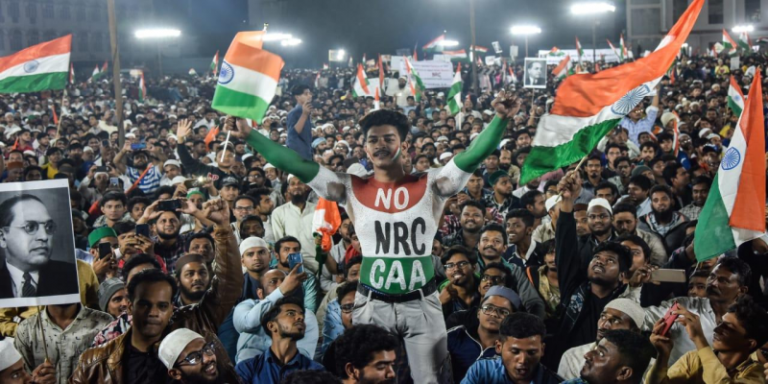VIRTUAL: Contested Nationalisms in Contemporary India
27 May 2021, 2:00 pm–3:30 pm

A roundtable discussion with Sharik Laliwala, Kalpana Wilson, Srilata Sircar, Dibyesh Anand and Karthick Ram Manoharan
This event is free.
Event Information
Open to
- All
Availability
- Yes
Cost
- Free
Organiser
-
Kaissa Karhu – Sarah Parker Remond Centre
Modi’s Hindu majoritarian coalition is violently reconfiguring India’s postcolonial political and social landscape. In Modi’s India, millions of Indian Muslims face disenfranchisement and internment in the context of citizenship reform; Kashmiris face further intensified occupation and repression; Dalit scholars and activists face increased violence and oppression; and peasant farmers are under threat from agrarian privatization, destitution, and widespread dispossession. The scale and intensity of these conflicts and crises make analysing the conjuncture in India both especially difficult and urgent: What competing visions of India are being invoked and evoked by striking farmers, anti-CAA protestors, and RSS cadres? Are we witnessing the death of secular nationalism in India, defeated by Hindutva chauvinism, or are Indian Muslims, Dalit activists, agrarian strikers, manufacturing workers, and student protestors demonstrating the vitality of older visions of a democratic and secular national project? Or, perhaps instead, the political forces, energies and constituencies taking to the streets suggest new forms of political collectivity, solidarity and peoplehood – beyond the nation?
In this event, we will explore how the ‘nation’ is deployed, reclaimed and subverted on the streets, highways, villages and online in contemporary India, and consider the tentative solidarities of resistance bubbling across the country.
Clearly populist, authoritarian nationalism is not unique to India – the coalition of an imagined majority middle-class, corporate capital, and fascist fantasies of purge and purification define many apparently ‘liberal democracies’ at this juncture. As such, an interrogation of India's crises can offer useful insights into our contemporary global moment, while of course necessarily requiring attention to the specific details and dynamics of the Indian context.
Jointly hosted by the Sarah Parker Remond Centre for the Study of Racism and Racialisation and the Geography Department at UCL, this event seeks to unpick some of these questions. Panellists will reflect on the contemporary struggle over different versions of (and against) Indian nationalism, thinking from and with different analytical frameworks (in relation to labour and land, caste and gender struggles, neoliberalism, Hindu nationalism/fascism, and citizenship) and from different places (whether Kashmir, Assam, Ahmedabad, Shaheen Bagh, Tikri Border or Bhima Koregaon). This event raises urgent questions about the deadly force of nationalisms in times of crisis, and yet the possibility and necessity of nurturing other, more expansive modes of collectivity.
Join us on 27th May at 2pm – 3.30pm for a panel discussion, featuring:
Sharik Laliwala
Sharik Laliwala is an independent researcher focusing on the political sociology of India's political class, and the state of religious minorities, especially Muslims in Gujarat and northern India. In past, he has been associated with the Trivedi Centre for Political Data at Ashoka University and produced original, large-scale datasets on the social profiles of Gujarat's legislators and ministers. He has also co-authored a chapter on the internal differentiations amongst ghettoized Muslims in Gujarat for the India Exclusion Report (2020). His opinion-editorials and essays have been featured in the Indian Express, Caravan, Wire, Scroll, Asia Dialogues, among others.
Kalpana Wilson
Kalpana Wilson is a Lecturer in the Geography Department at Birkbeck, University of London. Her research explores questions of race/gender, labour, neoliberalism, imperialism and reproductive rights and justice, with a particular focus on South Asia and its diasporas. She is the author of Race, Racism and Development: Interrogating History, Discourse and Practice (Zed Books, 2012) and co-editor of Gender, Agency and Coercion (Palgrave Macmillan, 2013). She is a founder member of South Asia Solidarity Group.
Srilata Sircar
Dr Srilata Sircar is a Lecturer in India and Global Affairs at the King's India Institute, King's College London. Her research interests lie at the intersection of urban political ecology, feminist geography, and postcolonial critique. She is the convener of the Confronting Caste series which is a set of conversations in podcast and panel formats that seeks to centre the analytic of caste in historical and contemporary contexts.
Dibyesh Anand
Professor Dibyesh Anand is the Head of the School of Social Sciences at the University of Westminster. He is the author of monographs Geopolitical Exotica: Tibet in Western Imagination and Hindu Nationalism in India and the Politics of Fear, and has spoken about and published on varied topics including Tibet, China-India border dispute, Hindu nationalism and Islamophobia in India, and the colonial occupation in Kashmir. He identifies as queer in personal and political terms.
Karthick Ram Manoharan
Dr Karthick Ram Manoharan is Marie Sklodowoska-Curie Actions Individual Fellow at the University of Wolverhampton working on the European Union funded project “Freedom From Caste: The Political Thought of Periyar E.V. Ramasamy in a Global Context.” He is the author of Frantz Fanon: Identity and Resistance (Orient BlackSwan 2019) and the co-editor of Rethinking Social Justice (Orient BlackSwan 2020). He has a forthcoming monograph on Periyar and religion.
This event will take place on Zoom. Please sign up via Eventbrite and you'll receive an email with the Zoom link before the event.
All welcome. Please do not hesitate to contact us if you need assistance on the day, and follow this FAQ link for more information and to read our virtual events code of conduct. All of our events are free, but you can support the IAS here.
 Close
Close

